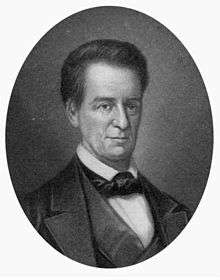Joseph Marshall Walker
Joseph Marshall Walker (July 1, 1784 – January 20, 1856) was a Louisiana soldier and politician. He was the 13th Governor of Louisiana, from 1850-1853.
Joseph Marshall Walker | |
|---|---|
 | |
| 13th Governor of Louisiana | |
| In office January 28, 1850 – January 18, 1853 | |
| Lieutenant | Jean Baptiste Plauché |
| Preceded by | Isaac Johnson |
| Succeeded by | Paul O. Hébert |
| Member of the Louisiana House of Representatives | |
| In office 1822 1832 1836 | |
| Personal details | |
| Born | July 1, 1784[1] New Orleans, Louisiana |
| Died | January 26, 1856 (aged 71)[1] New Orleans, Louisiana |
| Political party | Democratic |
| Spouse(s) | Catherine Carter |
Walker was born to an English father and a French-Creole mother in the French Quarter of New Orleans, Louisiana. At that time Louisiana was a colony of Spain. In 1807, he went to Mexico and joined the Spanish army, serving as a lieutenant of dragoons, and later becoming master of a military school at Chihuahua.
After the outbreak of the War of 1812 he returned to New Orleans and enlisted in the Louisiana State Militia. He served fighting against the British in the Battle of New Orleans at Chalmette, Louisiana.
Political career
A member of the Democratic Party, he was first elected to public office in 1820, as a member of the House of Representatives of Louisiana.
On January 22, 1822, he was made Brigadier General of the First Brigade of the State Militia, serving concurrently with his role as a member of the state house.
Walker was reelected to the legislature in 1822, 1832, and 1836. He was active in promoting the State Militia, and was credited with improving the organization and discipline of that force.
In 1846 he served as State Treasurer.
In 1849 he ran for Governor, winning against split Whig opposition from General Alexander De Clouet and Duncan F. Kenner. On 28 January 1850, he became the first governor inaugurated in the new state capital at Baton Rouge.
As governor he established a free public school system for white children.
There was widespread opposition to the 1846 State Constitution, and a convention adopted a new one in 1852. Walker strongly objected to this document, and resigned because of this the following year, and retired to a family plantation in Rapides Parish. He turned down offers from Democratic Party officials to be their candidate for the United States House of Representatives. Joseph Marshall Walker died three years later in 1856.
References
- National Governors Association profile Archived 2011-06-04 at the Wayback Machine
- Sobel, Robert, and John Raimo, eds. Biographical Directory of the Governors of the United States, 1789–1978, Vol. 2, Westport, Conn.; Meckler Books, 1978. 4 vols.
- State of Louisiana - Biography
| Party political offices | ||
|---|---|---|
| Preceded by Isaac Johnson |
Democratic nominee for Governor of Louisiana 1849 |
Succeeded by Paul Octave Hébert |
| Political offices | ||
| Preceded by Isaac Johnson |
Governor of Louisiana 1850–1853 |
Succeeded by Paul Octave Hebert |
